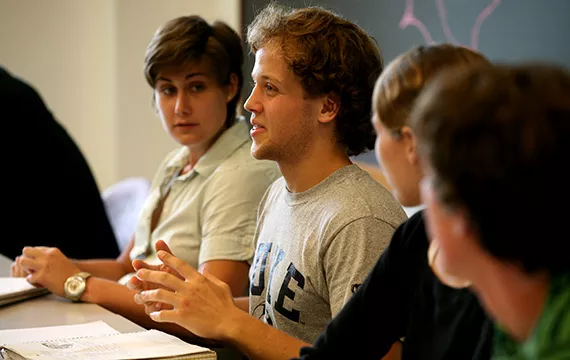Religion Café: The Senior Symposium

Religion Café: The Senior Symposium
This is a weekly symposium for senior Honors and Course majors on seminal themes, theories, and methods in the comparative, cross-cultural study of religion. We will focus on various approaches to the study of religion by reading scholars in several disciplines who have been influential in shaping the way we go about studying the phenomenon of religion (in the singular), the religious, religiousness (as practices), and the world's historical religious traditions. The course is self-consciously speculative and eclectic, and will emphasize not answers as much as the "better questions" that each week's readings bring to the comparative study of religious doctrine, theology, and practice.
The course argues for the inherently multidisciplinary nature of religious studies by surveying various approaches to the phenomenon of religion, from ethnography and post-structuralist theory, to anthropology, ethnology, social history, ethics, gender studies and cultural studies, the history of religions, phenomenology, semiology, and theory of art. Themes in any given year will vary. Core themes include religion, culture, and social reproduction; ritual, symbol, and pilgrimage; ethics, "thick" and "thin;" religious experience, gender, and embodiment; liminality, madness, and carnival; death and the ritual power of lament; otherness and difference; morphology and history; orientalism, giving and the Gift; colonialism, and power. Authors to be considered include Mircea Eliade, J.Z. Smith, Victor Turner, David Haberman, Amy Hollywood, Mikhail Bakhtin, Pierre Bourdieu, Luce Irigaray, Lila Abu-Lughod, Carolyn Walker Bynum, Ann Grozdins Gold, Michel Foucault, Edward Said, James Clifford, Avishai Margalit, David Freedberg, and Jacques Derrida.
Department Participation
Several sessions will be hosted by guest professors from the department who, along with setting up the discussion of specific readings, will use the readings and themes of the session to reflect on their own scholarly work, and on the thinkers, themes, and methodological perspectives that have most deeply influenced them.



